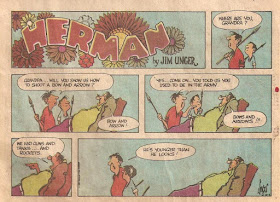
Since my last post regarding the sudden implementation of updated technology in Nancy, I intended to show a similar usage of updated technology that ruined what was a personal favorite strip of mine. Starting on July 3rd 2011, new Herman Sunday comics were being produced.

Pretty much every advancement of new technology has faced the future with the prospect that "This newfangled device will threaten our way of life!", the alarmist message not being too far off the mark. Since it would change things - whether for the better or for the worse being constantly under debate.

What surprised me was that despite my distaste, there were apparently far less instances of modern technology in the newer Herman Sundays than I thought.

It's not so much the implementation of newer technology that bothered me. There were many strips where Herman showed remarkable ingenuity about technology. It's that the newer strips fail to show the absurdity of technological advances.



Not to mention that many Herman strips had box-like TVs, so seeing Flat Screen TVs in Herman is something of an anachronism. I've grown so used to seeing old-timey wimey technology there that seeing Herman join the 21st Century without a spacesuit is considered unusual.

 |
| Fun fact - the updated version has slightly different monologue in some places. |

The last panel of Herman tend to be spoken by one person only, lending further impact to the punchline depending on the size of the panel. The Turnkey's comment here is pretty much redundant. You could remove it, and the outcome would be just the same.

On the opposite end, this strip suffers from the opposite problem. There's a kind of meanness in the newer strips that wasn't evident. Sure, there were the occasional barb thrown about, and a henpecked husband, but in terms of relationships, it was more The Better Half than The Lockhorns. What exactly is supposed to be funny about the above strip? Or the one below?


Now, compare these with this one:

Another great
of Herman is that it packages so much material with very little. With just a few spoken words, you get the full breadth of a story that we're seeing a bit part of. We know that the couple next door has gotten into tense arguments that are audible to their neighbors. We get the gist of what they tend to argue about. We know the Husband is nosy only as a precaution. We see the Wife clearly doesn't want him to indulge in this foolish behavior, even as she benefits from it. All this and more can be gleamed from the absurdity of the scene. And Jim Unger did this on a regular basis for almost twenty years!
The only daily I saw that was done by the new artist was one that was a redraw of an older strip.


The great appeal of Herman was that it showed naturalistic dialogue that could be spoken by just about anybody. That kind of honesty is hard to come across when being mass produced by someone else who hasn't had the experience of several years of deadpan humour.



As a result of the strip changing hands, it approached sitcom territory not unlike how the first Seven Seasons of The Simpsons were demythologized by later Seasons that bypassed thought-provoking multidimensional layered jokes with emotional depth by forgoing multiple needed rewrites and instead going for the cheap laugh.


 |
| Sure there's deliberate repetition of panels and probably photocopying involved, but don't knock at the usage of well-timed silent panels. |

 |
| What's wrong with that guy's back in the last panel there? |

After that nonsensical one, they went back into reruns before resuming in December. There were always the occasional baffling Herman comic, but even those gave you the opportunity to think about them. What point is exactly being made here?
It just goes to show that despite being an architect of another time (Box TVs everywhere), Herman was surprisingly progressive in ways you wouldn't think. Talking about Genetic Manipulation, Recycling, Computer Design of Products, Miniturization, and a lot more!
























